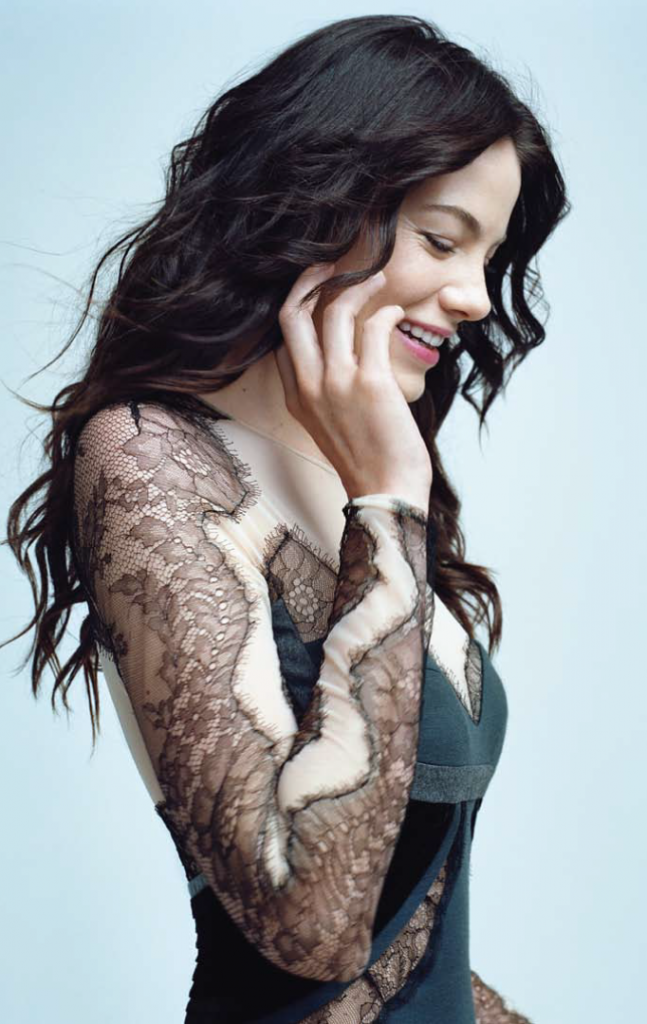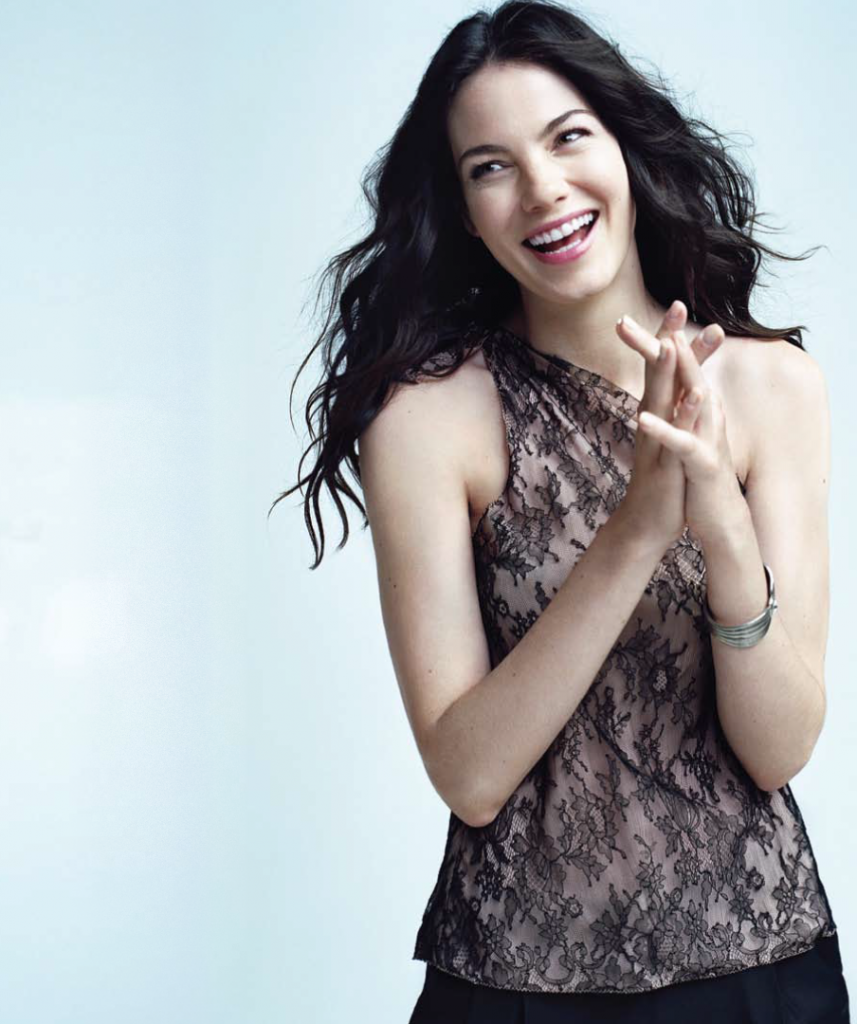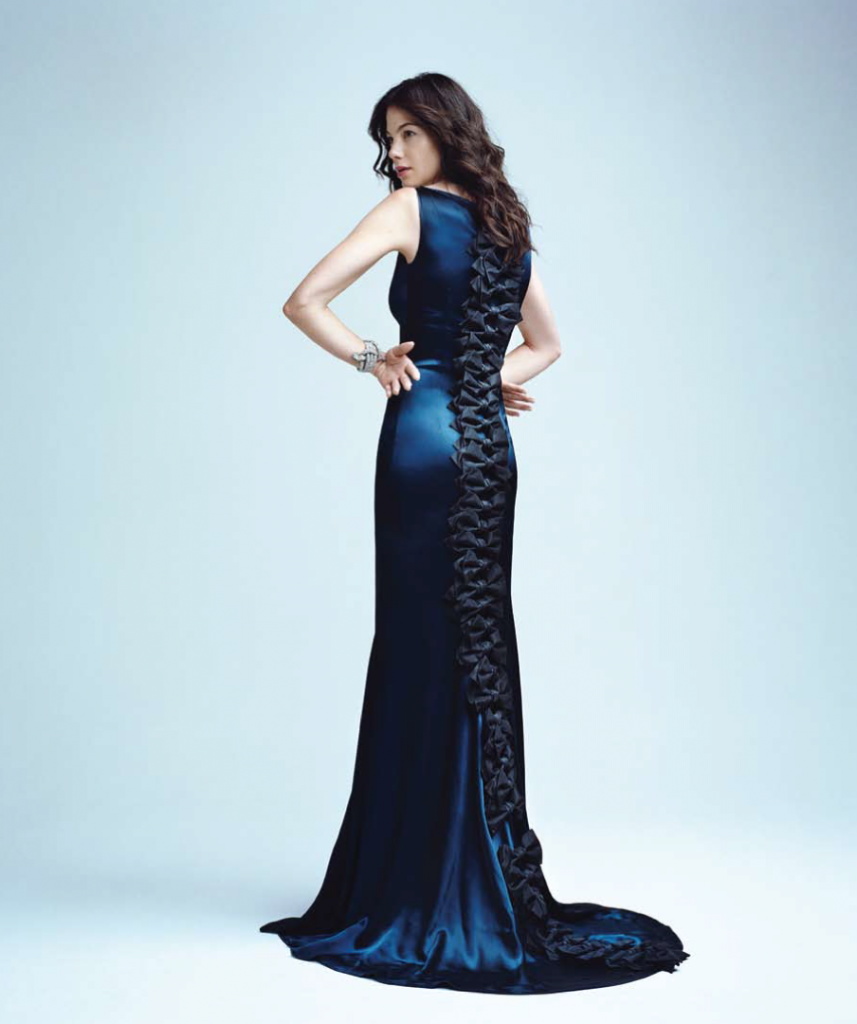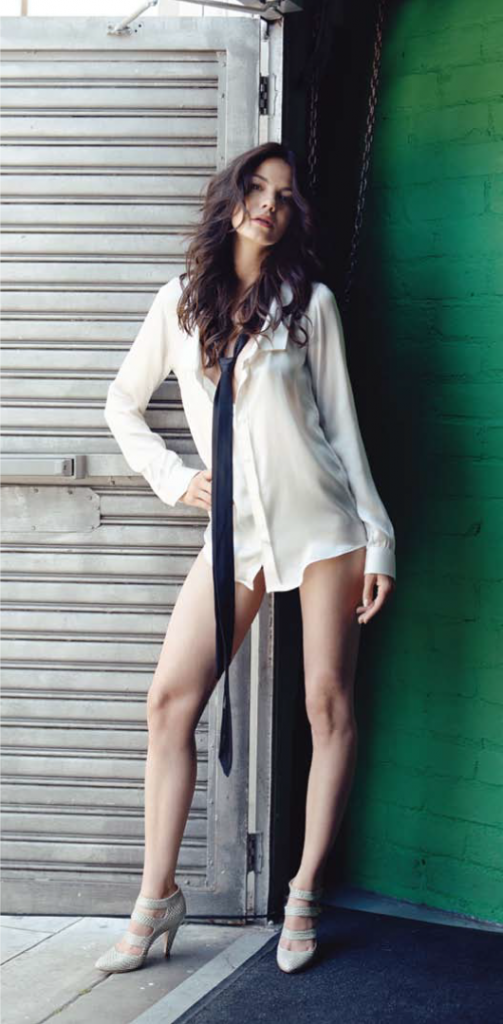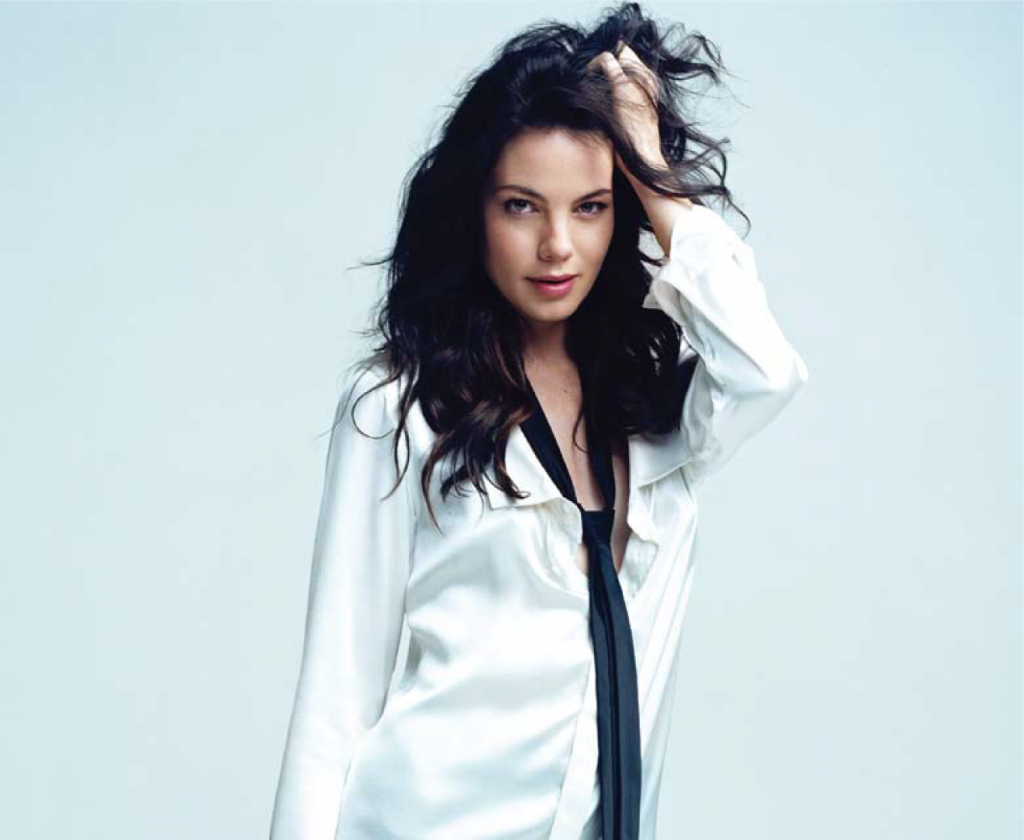
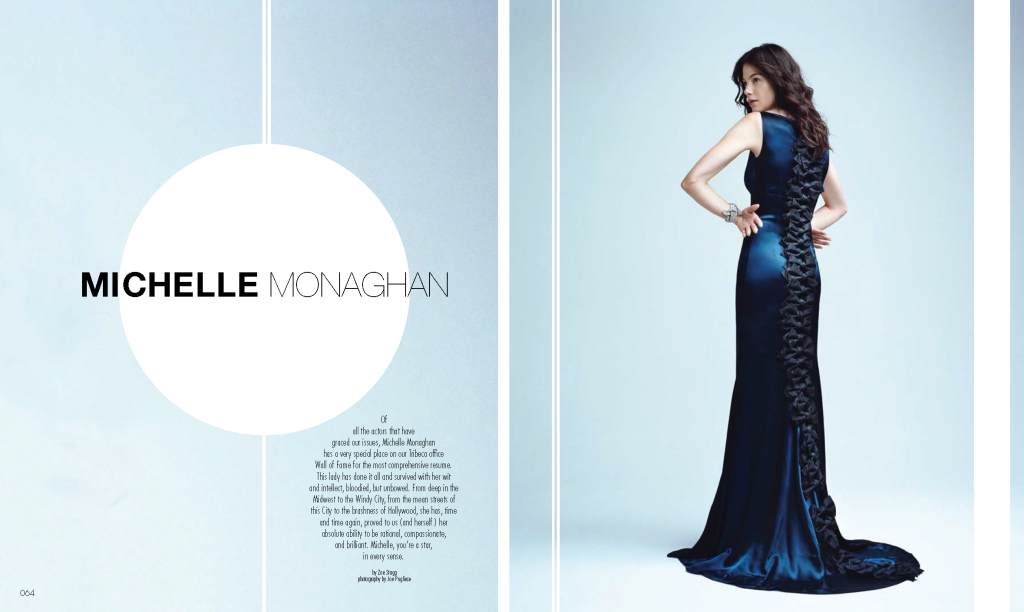
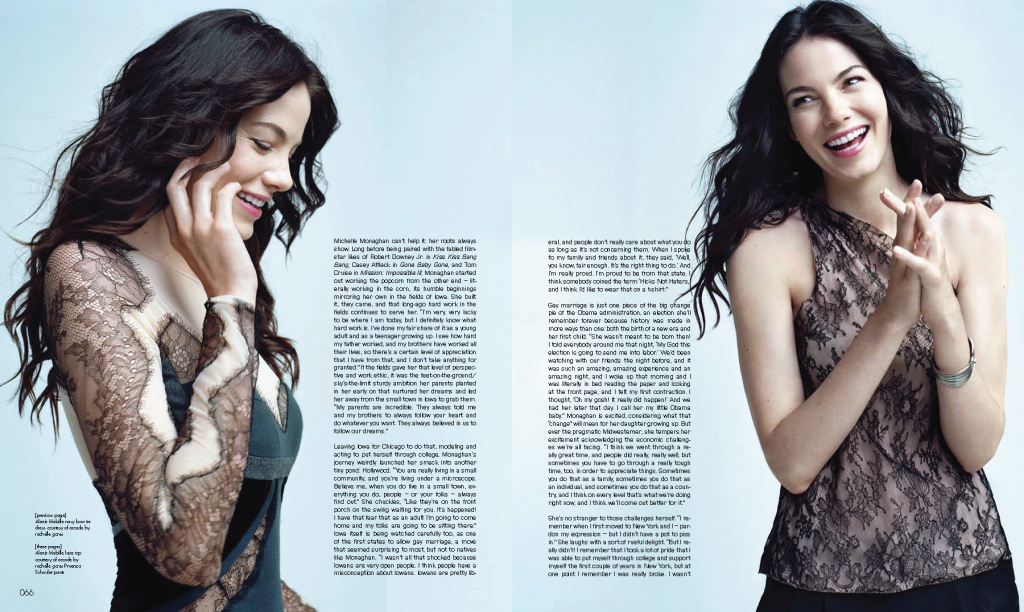
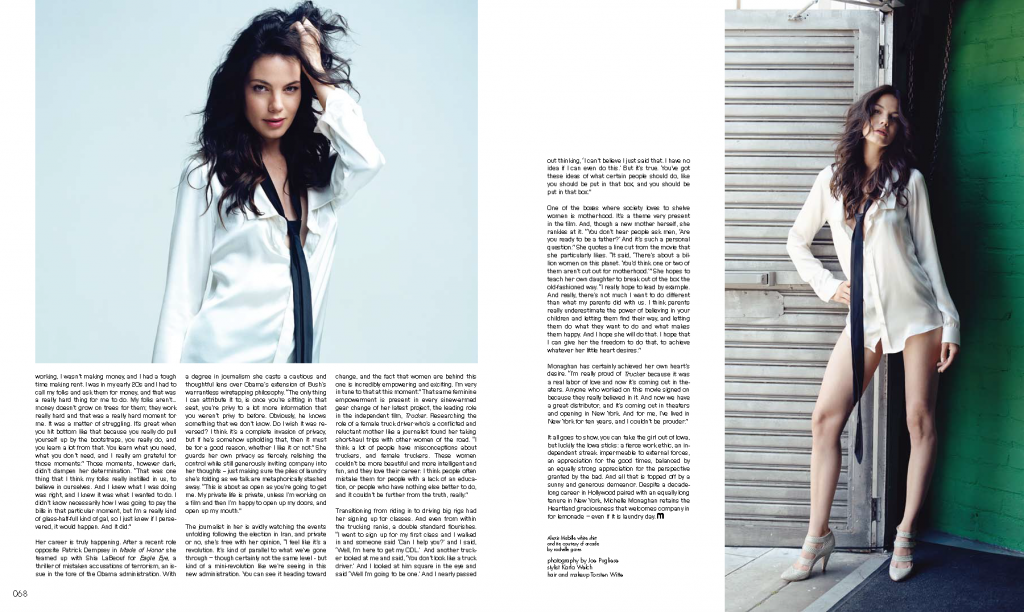
by Zoe Stagg
photography by Joe Pugliese
Michelle Monaghan can’t help it: her roots always show. Long before being paired with the fabled film-star likes of Robert Downey Jr. in Kiss Kiss Bang Bang, Casey Affleck in Gone Baby Gone, and Tom Cruise in Mission: Impossible III, Monaghan started out working the popcorn from the other end – literally working in the corn, its humble beginnings mirroring her own in the fields of Iowa. She built it, they came, and that long-ago hard work in the fields continues to serve her. “I’m very, very lucky to be where I am today, but I definitely know what hard work is. I’ve done my fair share of it as a young adult and as a teenager growing up. I see how hard my father worked, and my brothers have worked all their lives, so there’s a certain level of appreciation that I have from that, and I don’t take anything for granted.” If the fields gave her that level of perspective and work ethic, it was the feet-on-the-ground/sky’s-the-limit sturdy ambition her parents planted in her early on that nurtured her dreams and led her away from the small town in Iowa to grab them. “My parents are incredible. They always told me and my brothers to always follow your heart and do whatever you want. They always believed in us to follow our dreams.”
Leaving Iowa for Chicago to do that, modeling and acting to put herself through college, Monaghan’s journey weirdly launched her smack into another tiny pond: Hollywood. “You are really living in a small community, and you’re living under a microscope. Believe me, when you do live in a small town, everything you do, people – or your folks – always find out.” She chuckles, “Like they’re on the front porch on the swing waiting for you. It’s happened! I have that fear that as an adult I’m going to come home and my folks are going to be sitting there.” Iowa itself is being watched carefully too, as one of the first states to allow gay marriage, a move that seemed surprising to most, but not to natives like Monaghan. “I wasn’t all that shocked because Iowans are very open people. I think people have a misconception about Iowans. Iowans are pretty liberal, and people don’t really care about what you do as long as it’s not concerning them. When I spoke to my family and friends about it, they said, ‘Well, you know, fair enough. It’s the right thing to do.’ And I’m really proud. I’m proud to be from that state. I think somebody coined the term ‘Hicks Not Haters,’ and I think I’d like to wear that on a t-shirt.”
Gay marriage is just one piece of the big change pie of the Obama administration, an election she’ll remember forever because history was made in more ways than one: both the birth of a new era and her first child. “She wasn’t meant to be born then! I told everybody around me that night, ‘My God this election is going to send me into labor.’ We’d been watching with our friends the night before, and it was such an amazing, amazing experience and an amazing night, and I woke up that morning and I was literally in bed reading the paper and looking at the front page, and I felt my first contraction. I thought, ‘Oh my gosh! It really did happen!’ And we had her later that day. I call her my little Obama baby.” Monaghan is excited, considering what that “change” will mean for her daughter growing up. But ever the pragmatic Midwesterner, she tempers her excitement acknowledging the economic challenges we’re all facing. “I think we went through a really great time, and people did really, really well, but sometimes you have to go through a really tough time, too, in order to appreciate things. Sometimes you do that as a family, sometimes you do that as an individual, and sometimes you do that as a country, and I think on every level that’s what we’re doing right now, and I think we’ll come out better for it.”
She’s no stranger to those challenges herself. “I remember when I first moved to New York and I – pardon my expression – but I didn’t have a pot to piss in.” She laughs with a sort of rueful delight. “But I really didn’t! I remember that I took a lot of pride that I was able to put myself through college and support myself the first couple of years in New York, but at one point I remember I was really broke. I wasn’t working, I wasn’t making money, and I had a tough time making rent. I was in my early 20s and I had to call my folks and ask them for money, and that was a really hard thing for me to do. My folks aren’t… money doesn’t grow on trees for them; they work really hard and that was a really hard moment for me. It was a matter of struggling. It’s great when you hit bottom like that because you really do pull yourself up by the bootstraps, you really do, and you learn a lot from that. You learn what you need, what you don’t need, and I really am grateful for those moments.” Those moments, however dark, didn’t dampen her determination. “That was one thing that I think my folks really instilled in us, to believe in ourselves. And I knew what I was doing was right, and I knew it was what I wanted to do. I didn’t know necessarily how I was going to pay the bills in that particular moment, but I’m a really kind of glass-half-full kind of gal, so I just knew if I persevered, it would happen. And it did.”
Her career is truly happening. After a recent role opposite Patrick Dempsey in Made of Honor she teamed up with Shia LaBeouf for Eagle Eye, a thriller of mistaken accusations of terrorism, an issue in the fore of the Obama administration. With a degree in journalism she casts a cautious and thoughtful lens over Obama’s extension of Bush’s warrantless wiretapping philosophy. “The only thing I can attribute it to, is once you’re sitting in that seat, you’re privy to a lot more information that you weren’t privy to before. Obviously, he knows something that we don’t know. Do I wish it was reversed? I think it’s a complete invasion of privacy, but if he’s somehow upholding that, then it must be for a good reason, whether I like it or not.” She guards her own privacy as fiercely, relishing the control while still generously inviting company into her thoughts — just making sure the piles of laundry she’s folding as we talk are metaphorically stashed away. “This is about as open as you’re going to get me. My private life is private, unless I’m working on a film and then I’m happy to open up my doors, and open up my mouth.”
The journalist in her is avidly watching the events unfolding following the election in Iran, and private or no, she’s free with her opinion, “I feel like it’s a revolution. It’s kind of parallel to what we’ve gone through – though certainly not the same level – but kind of a mini-revolution like we’re seeing in this new administration. You can see it heading toward change, and the fact that women are behind this one is incredibly empowering and exciting. I’m very in tune to that at this moment.” That same feminine empowerment is present in every sinew-armed gear change of her latest project, the leading role in the independent film, Trucker. Researching the role of a female truck driver who’s a conflicted and reluctant mother like a journalist found her taking short-haul trips with other women of the road. “I think a lot of people have misconceptions about truckers, and female truckers. These women couldn’t be more beautiful and more intelligent and fun, and they love their career. I think people often mistake them for people with a lack of an education, or people who have nothing else better to do, and it couldn’t be further from the truth, really.”
Transitioning from riding in to driving big rigs had her signing up for classes. And even from within the trucking ranks, a double standard flourishes. “I went to sign up for my first class and I walked in and someone said ‘Can I help you?’ and I said, ‘Well, I’m here to get my CDL.’ And another trucker looked at me and said, ‘You don’t look like a truck driver.’ And I looked at him square in the eye and said ‘Well I’m going to be one.’ And I nearly passed out thinking, ‘I can’t believe I just said that. I have no idea if I can even do this.’ But it’s true. You’ve got these ideas of what certain people should do, like you should be put in that box, and you should be put in that box.”
One of the boxes where society loves to shelve women is motherhood. It’s a theme very present in the film. And, though a new mother herself, she rankles at it. “You don’t hear people ask men, ‘Are you ready to be a father?’ And it’s such a personal question.” She quotes a line cut from the movie that she particularly likes. “It said, ‘There’s about a billion women on this planet. You’d think one or two of them aren’t cut out for motherhood.’” She hopes to teach her own daughter to break out of the box the old-fashioned way. “I really hope to lead by example. And really, there’s not much I want to do different than what my parents did with us. I think parents really underestimate the power of believing in your children and letting them find their way, and letting them do what they want to do and what makes them happy. And I hope she will do that. I hope that I can give her the freedom to do that, to achieve whatever her little heart desires.”
Monaghan has certainly achieved her own heart’s desire. “I’m really proud of Trucker because it was a real labor of love and now it’s coming out in theaters. Anyone who worked on this movie signed on because they really believed in it. And now we have a great distributor, and it’s coming out in theaters and opening in New York. And for me, I’ve lived in New York for ten years, and I couldn’t be prouder.”
It all goes to show, you can take the girl out of Iowa, but luckily the Iowa sticks: a fierce work ethic, an independent streak impermeable to external forces, an appreciation for the good times, balanced by an equally strong appreciation for the perspective granted by the bad. And all that is topped off by a sunny and generous demeanor. Despite a decade-long career in Hollywood paired with an equally long tenure in New York, Michelle Monaghan retains the Heartland graciousness that welcomes company in for lemonade – even if it is laundry day.

